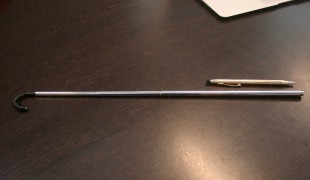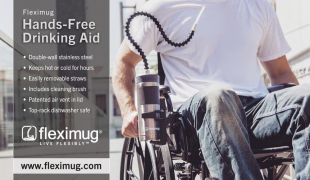- 9157
- 518
- 12
- 13
- 0
- Help Ukraine
About the solution
Parents with disabilities face numerous challenges when caring for a newborn. Besides the usual lack of sleep and anxiety about such a small and dependent life, much of the equipment for infants and children present substantial barriers for parents with disabilities. Changing tables are built for standing, bathtubs can take two hands, and cribs require parents to have substantial flexibility and lifting strength.
"My wife, Liz, is a little person; when she’s out of the house, she uses crutches and a lower-body brace that doesn’t bend. Around the house, we keep most of our storage low to the ground, and our activities are on the floor. By the time we brought our daughter, Madeleine, home from the hospital, we’d been thinking about the many adaptations needed to care for her. We consulted several times with Judi Rogers at Through the Looking Glass in Berkeley, Calif., a terrific organization with resources, advice, designs, and uniquely engineered equipment for parents with disabilities", Michael explained.
Cribs are manufactured according to strict standards designed for the safety of the child, not for universal access. The railings are all 2 or 3 feet off the floor, and a foot or more above the mattress. Because infants are left unattended in cribs overnight, they need to be built in such a way that the child cannot accidentally fall out of the crib or get any part of their body (especially the head and neck) trapped between components.
So he created a crib where the railing opens from side to side, and the mattress is positioned just above the floor. This make it easy for parents to access the crib!
Adapted from: http://www.instructables.com/id/Modified-Crib-for-Parent-with-Disability/
This solution shall not include mention to the use of drugs, chemicals or biologicals (including food); invasive devices; offensive, commercial or inherently dangerous content. This solution was not medically validated. Proceed with caution! If you have any doubts, please consult with a health professional.
DISCLAIMER: This story was written by someone who is not the author of the solution, therefore please be advised that, although it was written with the utmost respect for the innovation and the innovator, there can be some incorrect statements. If you find any errors please contact the patient Innovation team via info@patient-innovation.com
-
-
475
-
0
-
7137

Pointer that opens doors
CAREGIVING
Grip
Dwarfism
Assistive Daily Life Device (to help ADL)
Strategy/Tip
Restoring mobility
Promoting self-management
Building Supportive Community Relationships
Promoting inclusivity and social integration
Raise awareness
General and Family Medicine
Medical Genetics
Physical Medicine and Rehabilitation
Portugal
-
-
-
423
-
0
-
4349

Student designs sensory pod inspired by autistic son
CAREGIVING
COMMUNICATION: Communicating, whether by speaking, listening, or other means
Attend Concerts/Performances
Autism
Strategy/Tip
Assistive Daily Life Device (to help ADL)
Irritability or anger outbursts
Panic attacks
Racing thoughts
Feelings of guilt or worthlessness
Fatigue
Promoting self-management
Building Supportive Community Relationships
Promoting inclusivity and social integration
Enhancing Mental Health
Improving Speech and Communication
Preventing (Vaccination, Protection, Falls, Research/Mapping)
Raise awareness
Caregiving Support
Child and Adolescent Psychiatry
General and Family Medicine
Pediatrics
Psychiatry
United Kingdom
-
-
-
275
-
0
-
2725

David Cardell creates Fleximug to help his mother with Multiple sclerosis (MS)
(SELF)-CARE: DRINKING: Drinking independently.
SWALLOWING: Swalling food and liquids
CAREGIVING
Multiple Sclerosis
Assistive Daily Life Device (to help ADL)
Restoring mobility
Replacing lost limbs
Enhancing health literacy
Promoting self-management
Enhancing digestive function
Promoting inclusivity and social integration
General and Family Medicine
Internal Medicine
Medical Genetics
Neurology
Rheumatology
United States
-
 en
en